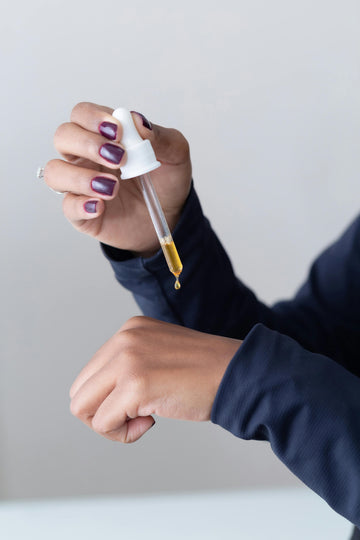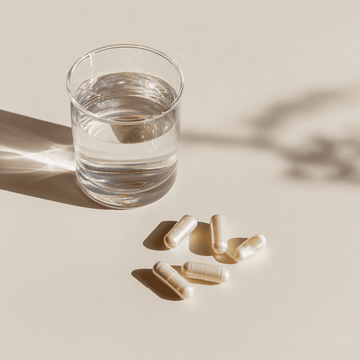Vitamin D3 and K2 – Why it’s better to take them together
Vitamin D3 is on everyone's lips – especially in the winter months, when sunlight is barely sufficient in our latitudes. However, combining it with vitamin K2 is increasingly being recommended. Why this can be not only sensible, but even necessary, is demonstrated not only by practical experience but also by research. In this article, you'll learn how D3 and K2 interact, what you should pay attention to when supplementing, and what the science says about it.
Why vitamin D3 is so important
Vitamin D3 (cholecalciferol) is a fat-soluble vitamin that our bodies can produce on our skin with the help of sunlight. It contributes to the absorption of calcium and phosphate from the intestines and is therefore crucial for maintaining healthy bones and teeth. It also supports the immune system, muscle function, and numerous metabolic processes.
A deficiency in vitamin D3 can manifest itself in fatigue, susceptibility to infections, depressive moods and, in the long term, bone loss (osteoporosis).
What does vitamin K2 do?
Vitamin K2 (especially in the form MK-7 ) is less well known, but plays an equally central role in calcium metabolism. It activates so-called matrix GLA proteins (MGP) and osteocalcin , which ensure that calcium is incorporated into the bones and does not end up in the blood vessels or organs. Vitamin K2 can therefore counteract arteriosclerosis .
Why D3 and K2 belong together
Vitamin D3 increases the absorption of calcium from food—which is generally a good thing. But without vitamin K2, there's a risk that this calcium will be deposited in the arteries instead of being incorporated into the bones. This is precisely where the combination of D3 and K2 comes in: D3 increases the availability of calcium, while K2 ensures that it ends up in the right place.
Scientific studies on the combination
A highly acclaimed study by Knapen et al. (2013) , published in the "Journal of Nutrition," examined the effects of vitamin K2 (MK-7) in postmenopausal women. After three years of supplementation, K2 was found to significantly slow bone loss and reduce arterial stiffness —an indicator of cardiovascular disease risk. Combining it with vitamin D3 further enhanced this effect.
Source: Knapen et al., 2013 - PubMed
What specific advantages does the combination offer?
Bone health: Calcium is efficiently incorporated into the skeleton, protecting against osteoporosis. Older people and postmenopausal women in particular benefit greatly from this, as bone mineral density decreases with age. The combination can help slow bone loss and maintain musculoskeletal stability.
cardiovascular system
Prevention of arteriosclerosis through targeted control of calcium absorption. Without sufficient K2, deposits can form in the blood vessels despite a good vitamin D supply, which can increase the long-term risk of high blood pressure, heart attack, or stroke. K2 specifically counteracts this process.
Holistic effect
Supports the immune system, muscles, and nervous system. While vitamin D stimulates the activity of immune cells, K2 simultaneously promotes healthy calcium metabolism in nerves and muscle tissue—this interaction is especially important during stressful phases of life and during physical activity.
Long-term prevention
Synergistic effect against signs of aging, inflammation, and chronic diseases. Studies suggest that the combination supports antioxidant processes in the body and has an anti-inflammatory effect – this could also prevent neurodegenerative diseases or metabolic disorders in the long term.
How should you take vitamin D3 and K2?
Together with a fatty meal
Both vitamins are fat-soluble and therefore better absorbed. Taking them with avocado, nuts, olive oil, or a main meal can significantly improve bioavailability.
In drop form or as a combo capsule
High-quality supplements often provide both vitamins in an optimized dosage (e.g., 2000–4000 IU D3 + 100–200 µg K2 as MK-7). Drops allow for flexible dosing and particularly rapid absorption through the oral mucosa.
Regular intake
Daily or, in consultation with a doctor, weekly dosage is possible. A consistent supply throughout the year is important—not just in winter. For individuals with a diagnosed deficiency, an initial higher dose under medical supervision may also be beneficial.
For whom is the combination particularly important?
People with vitamin D deficiency or insufficient sun exposure. The body's own synthesis is often limited, especially in autumn and winter, as well as in people with darker skin or older age.
Women in or after menopause. Declining estrogen levels negatively impact bone density. The D3-K2 combination can help slow this natural deterioration process.
People with cardiovascular risks or a family history of cardiovascular disease. People with high blood pressure, high cholesterol, or diabetes also benefit from the combination's vascular-protective effect.
Vegans, since K2 (MK-7) is found in fermented animal products – vegan K2 supplements from natto fermentation are a good option. These are purely plant-based and offer a good alternative to animal sources such as cheese or eggs.
Conclusion
Vitamin D3 is valuable on its own – but it only achieves its full effect in combination with vitamin K2. While D3 increases calcium levels in the blood, K2 ensures that calcium reaches the bones and doesn't stay in the arteries. Studies like those by Knapen et al. show that this combination not only promotes bone health but also protects the cardiovascular system. Therefore, anyone committed to long-term health should not only focus on vitamin D when supplementing – but also consider K2.
Tip: Look for high-quality combination supplements with MK-7, a stable carrier solution (e.g., MCT oil), and natural ingredients wherever possible. If unsure, a vitamin D blood test can help determine your individual needs.
Sources:
-
Knapen, MHJ, Braam, LAJL, Drummen, NE, Bekers, O., Hoeks, APG, & Vermeer, C. (2013).
Menaquinone-7 supplementation improves arterial stiffness in healthy postmenopausal women. The Journal of Nutrition, 143(6), 870-875. https://doi.org/10.3945/jn.112.172373 -
Schwalfenberg, GK (2007).
A review of the critical role of vitamin D in the functioning of the immune system and the clinical implications of vitamin D deficiency. Molecular Nutrition & Food Research, 51(9), 1031-1041. https://doi.org/10.1002/mnfr.200600271 -
Vermeer, C. (2012).
Vitamin K: the effect on health beyond coagulation – an overview. Food & Nutrition Research, 56(1), 5329. https://doi.org/10.3402/fnr.v56i0.5329 -
Pilz, S., Grübler, MR, Gaksch, M., Schwetz, V., Trummer, C., Hartaigh, B. Ó., & Marz, W. (2016).
Vitamin D and cardiovascular disease prevention. Nature Reviews Cardiology, 13(7), 404–417. https://doi.org/10.1038/nrcardio.2016.73




